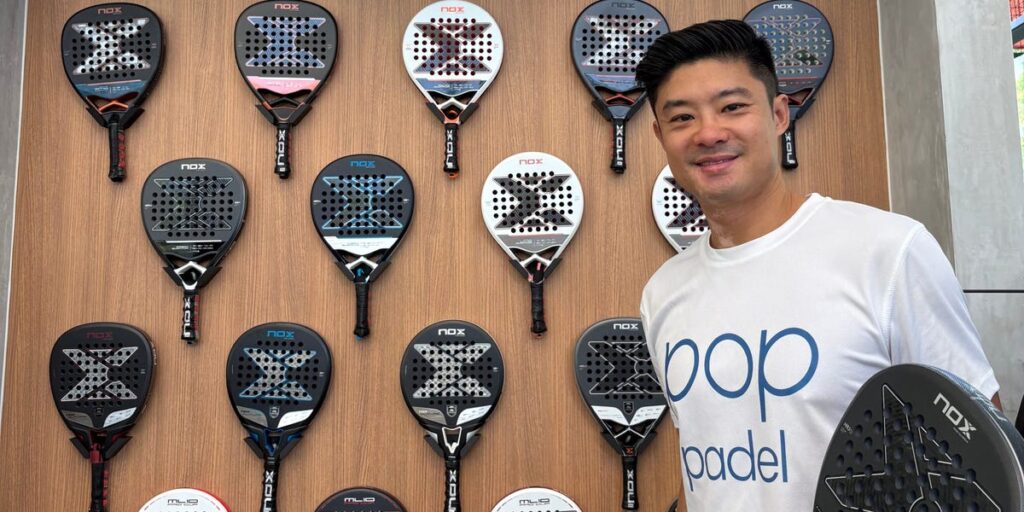This is an as-told-to essay based on a conversation with Davy Sanh, 39, a former manager at Grab who left his corporate career to launch Pop Padel, a padel club in Singapore. It has been edited for length and clarity.
I started my career with KPMG in Paris, spending five years as an auditor. I’m originally from France and moved to Singapore in 2014.
In total, I spent about 15 years in corporate across three different companies. Toward the end, in 2024, I was earning a six-figure salary as a manager at Grab.
I was good at my job, but not excellent. I saw my peers hopping on the right train, and they would move faster.
I felt, where can I be better than just good?
Betting on padel and myself
I left corporate about a year ago to start Pop Padel.
Padel is known for being one of the fastest-growing sports in the world. It’s new, easy to adopt, social, and the barrier to entry is a lot lower than, for example, tennis. Games are also shorter, which appeals more to the way our new generation is consuming sport.
Seeing how much the sport has been growing in other countries in the world — in Europe and in the Middle East — there was no reason it wouldn’t pick up in Asia.
I did consider though, was I the right person for this?
My background in tennis and expertise in the area gave me an edge. It was a risk worth taking because I also embrace the sport myself.
I have been a racket sports player my whole life, so I know the behavioral pattern of the players, what they like when they step into a club.
My friends and family saw my genuine passion and desire to grow the sport.
They were like, how can you spend so much time in tennis, not just playing, but observing, memorizing all the scores, watching every single game, following all the results as soon as you wake up — and not monetize it?
Founding the club wasn’t easy, but passion sells
There was a big round of fundraising we had to do. Most of the time, people did not take part.
I’ve had to overcome not getting disheartened and taking it personally when people choose not to journey with me.
We had to put together a very strong pitch with strong and sensible numbers. That’s where my background as an auditor and an accountant with KPMG helped.
My selling point was my expertise and knowledge in the racket sports world and my ability to connect worldwide with early movers and shakers of the industry. I was able to grow a large community of players here very quickly. There was a movement that I created, and they saw how genuine I was in doing this.
Some of the investors were even part of this group of players themselves. They saw the hard work, and they took a leap of faith and invested.
If you do your research right and you show passion and dedication, people will follow you.
We secured a seven-figure investment from Apricot Capital, a Singapore-based private investment firm, and opened our first outlet outside of Singapore in Malaysia in September.
Padel is the new golf for wealthy people
Padel is popular among high-net-worth individuals. People say padel is the new golf in terms of the potential for networking.
Because the space is smaller, when you book a game of two hours, it’s essentially four people playing together. It’s a prime time that you get with the person that you potentially want to socialize or network with.
High-net-worth individuals like to look for opportunities to network. But they tell me that they are fed up with the traditional way of networking — dining, going for F&B events. Those are always a bit stiff, and they have to care about how they dress and look.
In padel, it’s raw, bold, and authentic. We sweat like crazy, and we don’t look great on the court. We are mostly beginners at this point — it levels everyone out.
Watching people walk off the court happy beats any corporate win
When you’re an entrepreneur, you wake up, you get on your laptop. Before I go to bed, I bring my laptop into the bed and I continue working.
When it’s a project that you hold so close to your heart, you can’t just spend like one or two hours not thinking about it.
I try to find time to play and join the games. For our patrons, it’s also good for them to see me. I like to spend time with them, get to know them better.
It’s fulfilling because we are talking about sport, making people healthier and happier.
It’s also fulfilling to see that whatever you’ve conceptualized — in terms of coaching, lessons, program, and social tournament — the feedback is great.
People come out of the court with a smile.
When I was in the corporate world, my ambition was standard: looking forward to my next promotion. But it’s self-centered and egocentric.
With this project, the ambition has grown a lot wider. I do have the ambition to grow the Pop Padel brand, but I’m realizing how much this sport can empower people and make a positive impact.
Do you have a story to share about building a business in Asia? Contact this reporter at cmlee@insider.com.
Read the full article here


